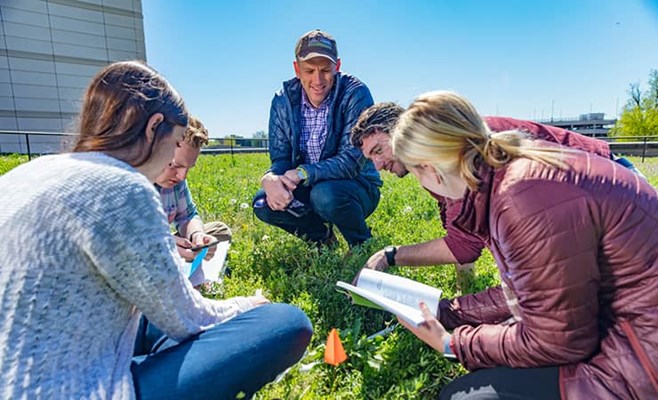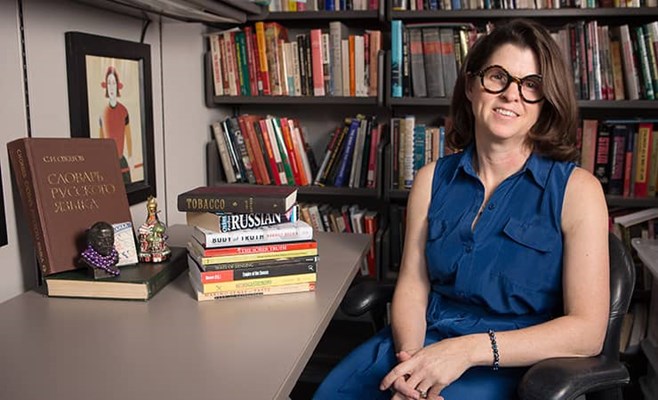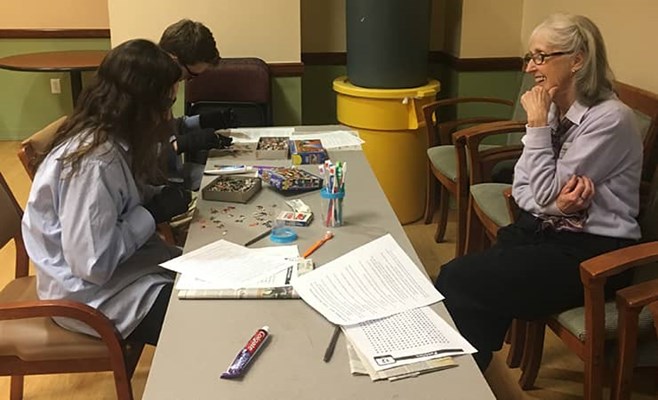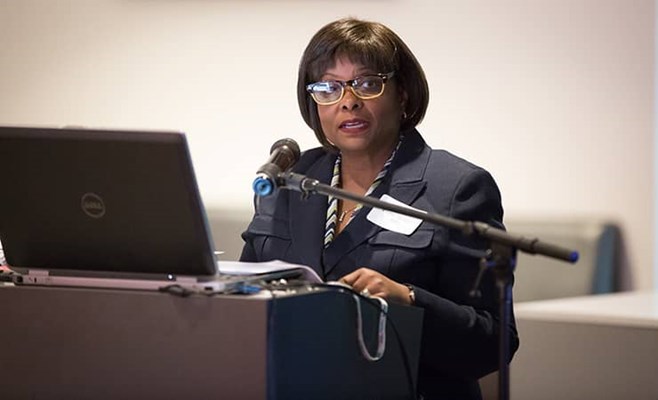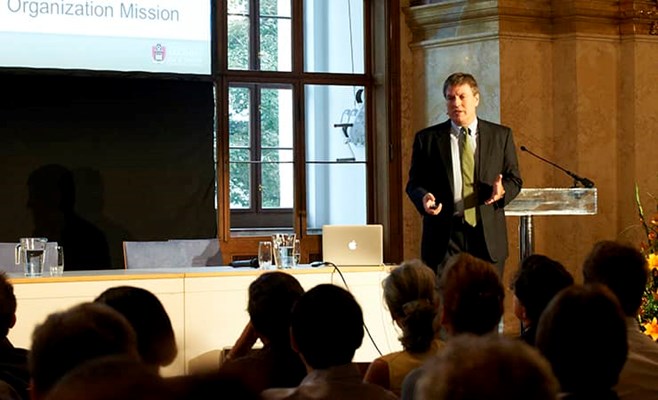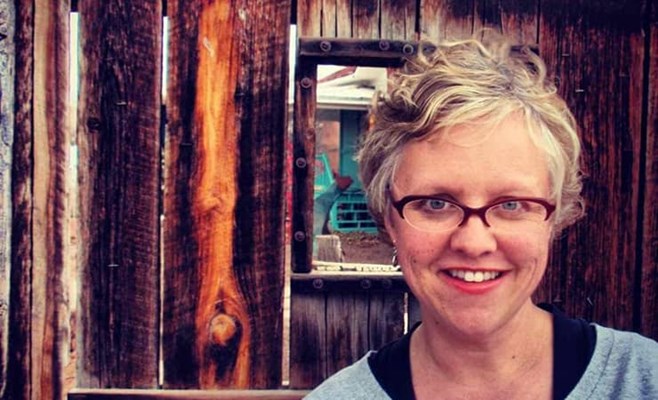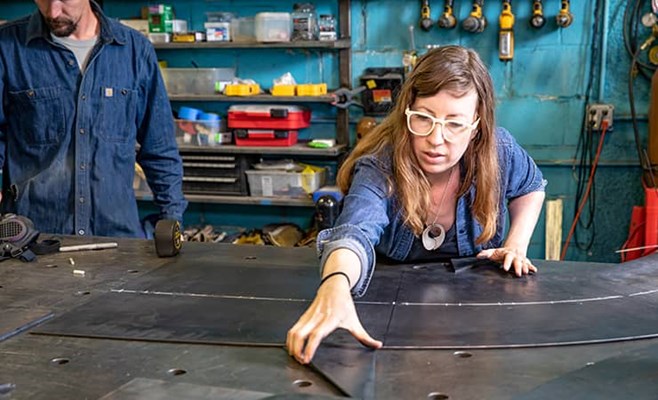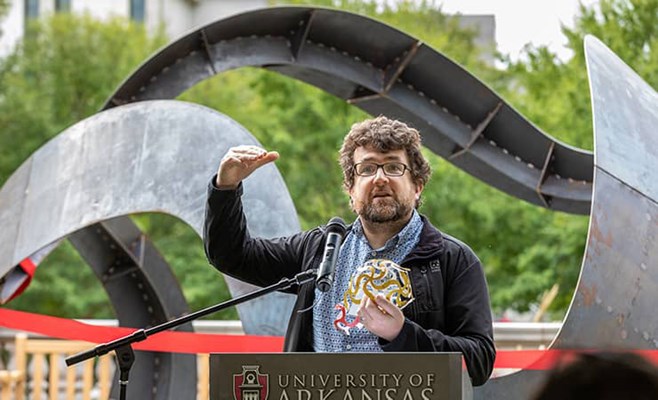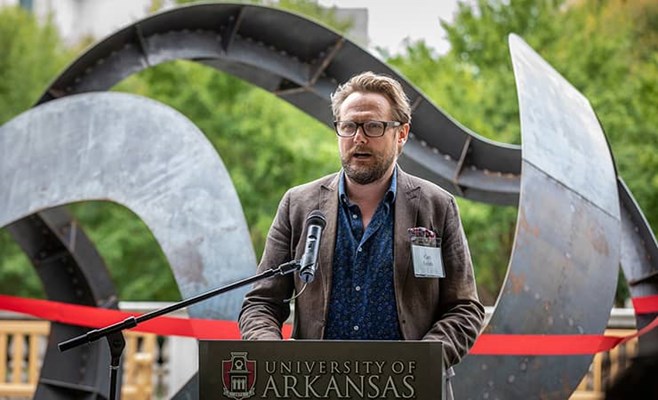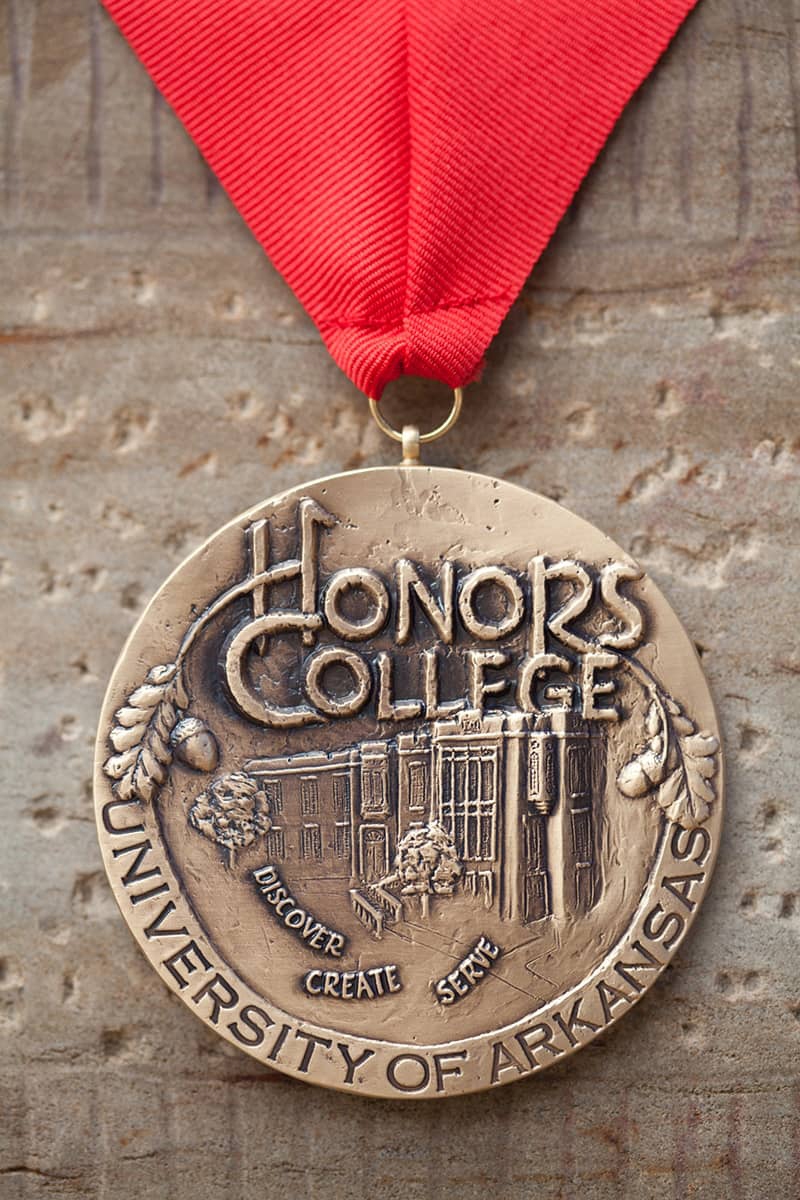Honors College Recognizes Exceptional Faculty
The Honors College will recognize nine faculty members at the annual Honors College Faculty Reception from 5:30-7 p.m. Tuesday, Nov. 9, in the Fowler House Conservatory. The awards are offered in three categories: the Distinguished Faculty Teaching and Research Award, the Distinguished Leadership Award and, new this year, the Distinguished Faculty Artistry Award.
"We are grateful to all of our honors faculty who support our students, from teaching amazing courses to writing countless letters of recommendation," said Honors College Dean Lynda Coon. "These nine have put in many extra hours to mentor honors thesis research, lead honors programs across campus and even develop original artwork here at Gearhart Hall. We look forward to celebrating their contributions next week."
Dean Coon will present a bronze medallion to this year's award winners, who will be introduced by the deans of their respective colleges. Each winner also will receive $1,000 in academic funding and will be listed on the Faculty Awards page of the Honors College web site.
DISTINGUISHED FACULTY TEACHING AND RESEARCH AWARDS
Fran Hagstrom, associate professor, communication sciences and disorders, College of Education and Health Professions. Fran Hagstrom's connection with honors began in 2003 when Reed Greenwood, then dean of the College of Education and Health Professions, asked her, Marcia Imbeau and Nan Smith-Blair to organize the college's honors program. Having laid the foundation for honors in her college, Hagstrom then worked with colleagues to develop the interprofessional Health Teams Abroad-Sweden study abroad program that launched in 2007, which has seen continuous enrollment with the exception of the 2020-2021 halt due to the pandemic.
In addition to these landmark accomplishments, Hagstrom has reviewed honors grant applications, participated in the annual fellowship interviews, and served on various Honors College subcommittees. Hagstrom has mentored more than 50 undergraduate honors theses, the majority of which resulted in national presentations. She also has served as a member of honors thesis committees in the College of Education and Health Professions, Fulbright College of Arts and Sciences and Bumpers College of Agricultural, Food and Life Sciences. Hagstrom has left a long-lasting mark on honors education in her college and across health preparatory and related programs at the university.
Benjamin Runkle, associate professor, biological and agricultural engineering, College of Engineering. Benjamin Runkle leads a research group that aims to enhance our understanding of globally relevant landscapes through connections between the carbon and water cycles. His research on rice irrigation practices has helped quantify a water-saving technique that significantly reduces the greenhouse gas production of these food-providing landscapes.
Runkle's honors students have examined questions related to irrigation water use, rice plant growth dynamics, and modeling agricultural systems. One of these theses was published in peer-reviewed literature. In 2018, Runkle helped initiate a team research grant focused on the campus's green roof on Hillside Auditorium that also supported several individual honors research theses. He has also advised honors theses in sustainable urban and rural topic areas and he co-leads a study abroad course to Ghent, Belgium, that attracts many honors students. He is planning to offer an Honors College Forum, Nature-based Climate Solutions, in 2022.
Runkle has been recognized as an outstanding teacher by the University of Arkansas Alumni Association, the American Society of Engineering Education, the College of Engineering, and the Department of Biological and Agricultural Engineering. In research, he has received recognition from the Rice Technical Working Group, the College of Engineering, and the National Science Foundation, which awarded him a CAREER grant on climate-smart irrigation strategies for rice agriculture. In service, Runkle has co-advised the LGBTQ+ affinity group, oSTEM at the University of Arkansas, since its inception in 2018.
Tricia Starks, director, Arkansas Humanities Center, and professor, history, Fulbright College of Arts and Sciences. Tricia Starks' Signature Seminar, Bad Medicine, is infamous for its gruesome and fascinating subject matter. Starks has also presented honors colloquia on the history of addiction; the history of race, class, sex and medicine; and the history of women in Russia and the Soviet Union. She brought her distinctive historical analysis to the panel of experts for the timely Honors College forums Pandemic (2020) and Vaccine (2021).
Starks has served on honors theses committees and served as mentor for seven honors students on topics such as the medical marketing of Eureka Springs, tuberculosis care of African Americans in Arkansas, and the role of sectarian religious groups in the decline of tsarist Russia. Her students have earned scholarships and high honors and moved into medical school, graduate school, law school and public health administration.
Her work with honors has extended to being president for Phi Beta Kappa and serving on campus review and interview panels for Honors College fellowships, and the campus interview committee for Fulbright fellowships. Starks is a member of the University of Arkansas Teaching Academy and was selected by the University of Arkansas Student Alumni Board as a teacher of the year in 2006. She has been celebrated as a Master Researcher and Master Teacher by the Fulbright College of Arts and Sciences and has served as an Honors College Dean's Fellow.
DISTINGUISHED LEADERSHIP AWARDS
John Delery, Walton College Professor and department chair, management, Sam M. Walton College of Business. John Delery served as director of the Walton College Honors Program during a period of rapid growth, from just over 500 students when he took over in fall 2015, to more than 830 students when he stepped down in fall 2020 -- an increase of more than 65%. In fall of 2016 the program added an honors advisor to complement the work done by Associate Director Jason Adams. During the 2017-18 academic year Delery and Walton honors staff embarked on a program to benchmark business honors programs across the U.S. This effort led directly to Walton College hosting the inaugural conference of business honors programs in the spring of 2018; 25 programs were represented in this initial conference and meetings have continued.
During his time as director Delery oversaw several changes to the academic requirements, including the expansion of internship theses and the addition of Walton College honors courses and colloquia. He also ensured that Honors College colloquia count towards honors graduation requirements. Additionally, Delery revived a college-level Walton honors committee that includes one member from each academic department. This committee has increased engagement and oversight of the program by the faculty.
Kirstin Erickson, associate professor, anthropology, Fulbright College of Arts and Sciences. During Kirstin Erickson's tenure as director of the Fulbright Honors Program, the number of students graduating with honors distinction increased from 155 (in 2017-18), to 200 honors graduates (in 2021). Through semi-annual mass thesis meetings and the establishment of a "sophomore milestone" marker, study abroad help sessions, new student orientation, and one-on-one conversations with students, she was able to advise honors scholars on everything from committee composition and research protocols to international research, fellowship applications and post-graduate plans. She increased the size of the Fulbright College Honors Council and organized faculty workshops on the honors thesis process and policy. To better support junior faculty and first-time thesis directors, she initiated a faculty mentoring program that pairs first-time faculty directors with seasoned Honors Council members.
Since 2017 she has led the beloved Honors Humanities Program (H2P), overseeing recruitment, retention and support of three extraordinary faculty teams, as well as promoting the program to incoming students. She has also worked closely with Fulbright College's Sturgis Fellowship and grants program. Finally, on the brink of the COVID-19 outbreak in the spring of 2020, she led the Fulbright honors team in heroically shifting the entire system of thesis defenses from a traditional face-to-face committee format to an online platform, providing the honors students (and their faculty mentors and committees) the guidance, back-up and reassurance they needed to follow through on their plans and preparations for a successful defense.
Yvette Murphy-Erby, vice-chancellor, Division for Diversity, Equity and Inclusion, and professor, social work, Fulbright College of Arts and Sciences. Yvette Murphy-Erby is a long-time champion of the Honors College Path Program. She participated in the inaugural committee established to explore funding opportunities for Path and served as co-principal investigator on the $1 million "Path to Graduation" grant awarded to the University of Arkansas by the National Science Foundation. She developed and for several years led a series of professional development modules focused on preparing Honors College faculty mentors for success in mentoring students, with a focus on historically underserved students. She also developed a series of modules designed to prepare students in the Path Program for mentoring success and delivers those lessons annually to each new group of incoming Path Scholars. She has mentored Honors College students in their efforts to incorporate a diversity, equity, and inclusion perspective in their thesis and research efforts. She has also supported Honors College staff in their efforts to weave diversity, equity and inclusion into every aspect of their work.
DISTINGUISHED FACULTY ARTISTRY AWARDS
Emily Baker, assistant professor, architecture, Fay Jones School of Architecture and Design. Honors alumna and former Bodenhamer Fellow Emily Baker has actively supported the Honors College since returning to campus in 2017, taking part in honors thesis committees, teaching honors sections, and working alongside Edmund Harriss and Carl Smith to develop Gearhart Hall's courtyard curvahedra sculpture.
To take the curvahedra form from a palm-size paper model to a 12-foot-diameter steel sculpture, Baker worked with Harris to develop a Zip-Form system. They are now partnering with structural design scholars at MIT to explore whether concrete structures can be created using curved formwork in such a way that the amount of material used is reduced while keeping the same structural rigidity. Zip-form, because of its ease in creating precise curving forms, is being tested as a method for constructing this formwork in countries where other means of advanced fabrication are less accessible -- bringing high tech solutions into spaces that don't always have high tech equipment. Baker will bring this research endeavor into the honors section of her Structures for Architects course at the Fay Jones School of Architecture and Design.
Edmund Harriss, clinical assistant professor, mathematical sciences, Fulbright College of Arts and Sciences. The heart of Edmund Harriss' work with the Honors College is closely related to the reason he became an academic: to take his specialist knowledge and combine it with the expertise of other professors active in the many diverse fields represented at the university. In his first Honors College course, Place in Mind, he worked with landscape architecture Professor Carl Smith and students from a wide range of disciplines to encourage engagement with the courtyard outside the Honors College itself. The proposal produced by this course led him to partner with Emily Baker, assistant professor of architecture, a fruitful collaboration with potential for sustainable innovation in concrete construction. In Spring 2022, Harriss will join with rare books librarian Joshua Youngblood to lead a Signature Seminar on Euclid, using Euclid's Elements as a window to explore geometry and the history of mathematics alongside the history of the book and the transmission of ideas over the last 2,300 years. He currently serves as an Honors College Dean's Fellow.
Carl Smith, professor, landscape architecture, Fay Jones School of Architecture and Design. Carl Smith has offered honors design studio and class sections for fourteen years and has helped shepherd honors student work to national awards and peer-reviewed publication and presentation at national and international venues.
His part in the courtyard curvahedra grew from collaboration with Edmund Harriss, where the two explored the use of drawing and mathematics to identify, abstract, and communicate the special qualities of spaces and places. These are methods he continues to use to this day, working with communities from Conway, Arkansas, to Dushanbe, Tajikistan, and Athens, Greece. Through the Honors College Signature Seminar Place in Mind, the students, Harriss and Smith alighted on key strategies and tactics to lift the aesthetic experience and quality of the courtyard; qualities that later informed Smith's master planning work for the project. Smith received the Honors College Distinguished Research and Teaching Faculty award in 2016 and has served as an Honors College Dean's Fellow.
Topics
- Awards
- Fay Jones School of Architecture and Design
- College of Education and Health Professions
- College of Engineering
- Fulbright College of Arts & Sciences
- Sam M. Walton College of Business
- Department of Anthropology
- Department of History
- Department of Management
- Department of Mathematical Sciences
- School of Social Work
- Department of Architecture
- Department of Landscape Architecture
- Communication Sciences and Disorders Program
- Department of Rehabilitation, Human Resources and Communication Disorders
- Department of Biological & Agricultural Engineering
Contacts
Kendall Curlee, director of communications
Honors College
479-575-2024,
kcurlee@uark.edu
Headlines
PetSmart CEO J.K. Symancyk to Speak at Walton College Commencement
J.K. Symancyk is an alumnus of the Sam M. Walton College of Business and serves on the Dean’s Executive Advisory Board.
Faulkner Center, Arkansas PBS Partner to Screen Documentary 'Gospel'
The Faulkner Performing Arts Center will host a screening of Gospel, a documentary exploring the origin of Black spirituality through sermon and song, in partnership with Arkansas PBS at 7:30 p.m. Thursday, May 2.
UAPD Officers Mills and Edwards Honored With New Roles
Veterans of the U of A Police Department, Matt Mills has been promoted to assistant chief, and Crandall Edwards has been promoted to administrative captain.
Community Design Center's Greenway Urbanism Project Wins LIV Hospitality Design Award
"Greenway Urbanism" is one of six urban strategies proposed under the Framework Plan for Cherokee Village, a project that received funding through an Our Town grant from the National Endowment for the Arts.
Spring Bike Drive Refurbishes Old Bikes for New Students
All donated bikes will be given to Pedal It Forward, a local nonprofit that will refurbish your bike and return it to the U of A campus to be gifted to a student in need. Hundreds of students have already benefited.
